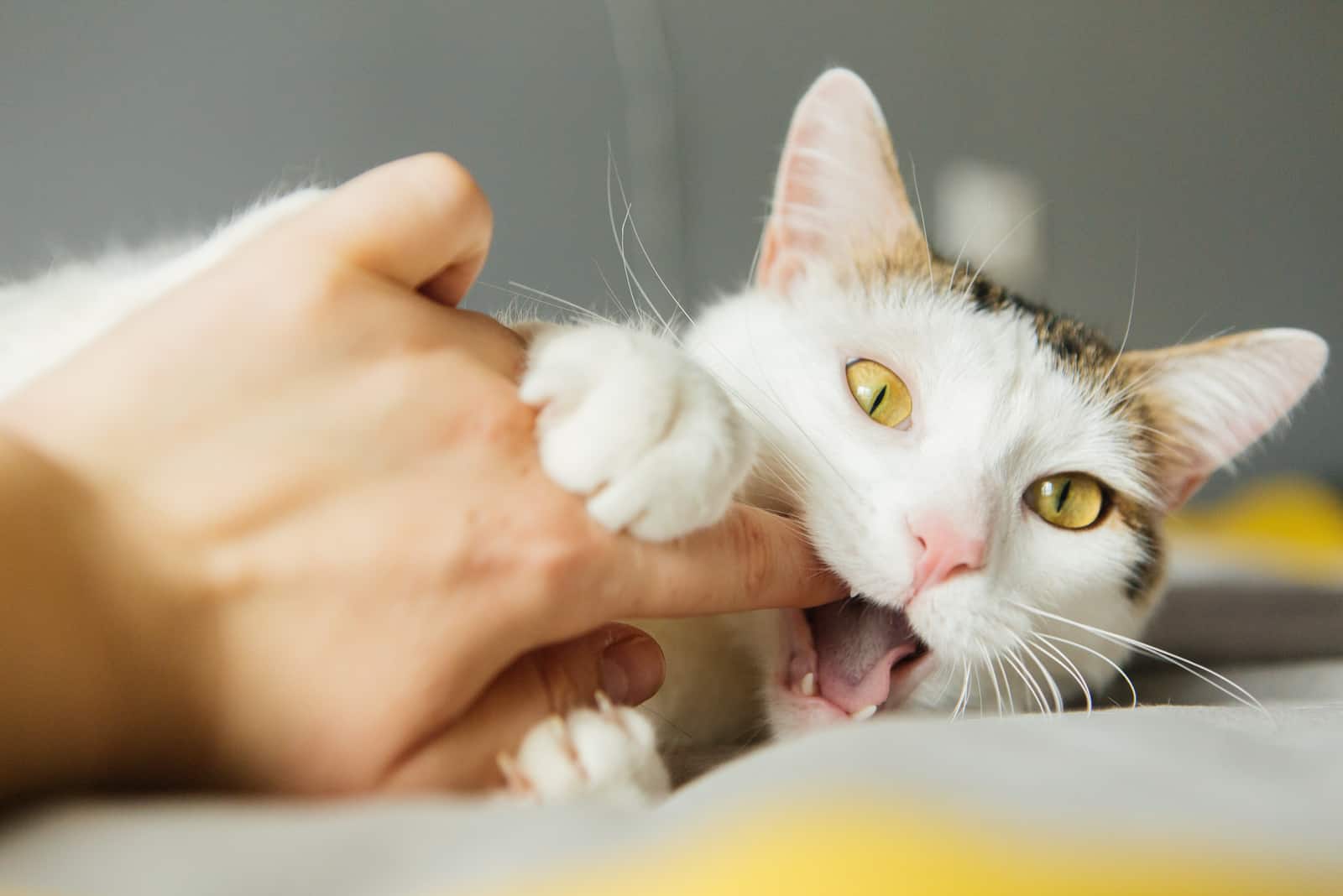If you’re wondering, “Why does my cat keep biting me? you’re not alone. Many cat owners experience this behavior, ranging from playful nibbles to painful bites. Understanding the reasons behind cat biting can help you address the issue effectively and build a stronger bond with your furry friend.
Common Reasons Why Cats Bite
Playfulness and Overexcitement
- Cats, especially kittens, often bite during playtime as they learn how to interact.
- Cats may develop a habit of biting hands or feet if rough play is encouraged.
- Using interactive toys instead of hands can help redirect their playful instincts.
Overstimulation from Petting
- Some cats have little patience for extended petting.
- Warning signs include tail flicking, ear flattening, or sudden tensing.
- Learning your cat’s limits and stopping before they become overstimulated can prevent bites.
Fear and Anxiety
- A scared or anxious cat may bite as a defensive reaction.
- Common triggers include unfamiliar people, loud noises, or past trauma.
- Creating a calm and safe space can reduce fear-induced aggression.
Territorial or Possessive Behavior
- Cats can bite to assert dominance or protect their territory.
- Introducing new pets or people gradually can help minimize territorial aggression.
Redirected Aggression
- If a cat is agitated by an external factor, such as another animal outside, they may redirect their aggression toward their owner.
- Avoid sudden interactions when your cat appears tense or fixated on something.
Medical Issues and Pain
- Sudden biting can signify pain caused by dental issues, arthritis, or injuries.
- A veterinary check-up is necessary if biting is unusual or aggressive.
How to Stop Your Cat from Biting
Avoid Encouraging Hand-Biting
- Never use your fingers or feet as toys.
- Provide engaging toys like feather wands and balls to satisfy their play instincts.
Recognize and Respect Their Boundaries
- Watch for warning signs of overstimulation and stop petting before they become agitated.
- Let your cat approach you on their terms instead of forcing interaction.
Socialize and Train Early
- Kittens should be exposed to different environments, people, and experiences.
- Reward positive behavior with treats and gentle praise.
Redirect Aggressive Energy
- If your cat is fixated on something outside, distract them with interactive play.
- Avoid sudden movements or loud noises that may provoke aggression.
Reduce Stress and Anxiety
- Provide hiding spots, cozy beds, and vertical spaces for security.
- Consider pheromone diffusers to help soothe nervous cats.
Consult a Veterinarian When Needed
- If changes in behavior accompany biting, it could indicate a medical issue.
- Professional help from a vet or behaviorist can be valuable for extreme cases.
Training Your Cat to Stop Biting
Use a Firm “No” Command
- If your cat bites say “No” in a firm but calm tone.
- Immediately stop interaction to show that biting leads to loss of attention.
Offer Alternative Outlets
- Redirect their biting urges to a chew toy or soft plush toy.
- Praise them when they use the appropriate object.
Apply Time-Outs for Persistent Biting
- If your cat continues biting, gently place them in a quiet space for a short time.
- This teaches them that biting leads to separation from play and attention.
Reward Good Behavior
- Reinforce non-biting behavior with treats, affection, and praise.
- Avoid punishment, as it may create fear and worsen aggression.
Conclusion
Understanding why your cat bites is the first step in correcting the behavior. Whether your cat bites due to playfulness, fear, stress, or overstimulation, recognizing the triggers allows you to take proper action. By setting boundaries, redirecting your cat’s energy, and using positive reinforcement, you can create a peaceful and loving bond with your cat. If the biting behavior persists despite your efforts, consulting a veterinarian or animal behaviorist is recommended.
Frequently Asked Questions (FAQs)
Why does my cat randomly bite me?
Cats may bite randomly due to overstimulation, playfulness, or frustration. Observing their body language can help identify the cause.
How can I teach my cat to stop biting?
Consistency, redirection, and positive reinforcement are key. Avoid using hands as toys and reward good behavior with treats and praise.
Is biting normal for kittens?
Yes, kittens explore their surroundings by biting. Proper training can help them learn bite inhibition early.
What should I do if my cat’s bite causes injury?
Clean the wound immediately and monitor for signs of infection. If swelling or redness occurs, seek medical attention.
Can stress cause my cat to bite?
Yes, stress and anxiety can lead to defensive biting. Providing a secure and calm environment can help reduce stress-induced aggression.
Should I punish my cat for biting?
No, punishment can increase fear and aggression. Using positive reinforcement is a more practical approach to correcting behavior.
